4 Forward-Looking Use Cases For Blockchain In Agriculture
Updated 26 Aug 2023
16 Min
3849 Views
We are what we eat. This old proverb remains topical to this very day. That is why it is very important for us all to buy high-quality food that is fresh, not spoilt, and free of different deleterious bacteria. Food suppliers also want to purchase food from proven farms, especially if we speak about meat, fruits, and vegetables. It was rather difficult before to track the way how products go from farm to the market, but today blockchain revolutionizes almost all industries including the agricultural sector.
How blockchain modifies agriculture and why the right software development service can help both consumers and farmers? This article will show you.
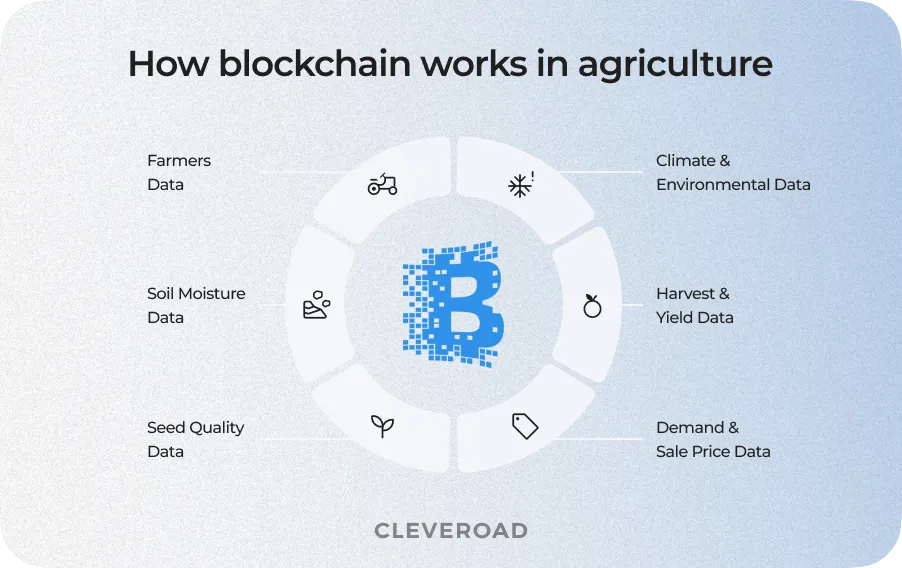
How blockchain in agriculture works
What Is Blockchain Technology in Agriculture
Blockchain technology provides all users with efficient data protection, transparent and secure data exchange. All information written in blockchain cannot be changed, and its storage is decentralized. All these properties make blockchain technology the best tool for encrypted information transfer. Agriculture is the largest sector of the world economy, with an annual turnover of more than $1 trillion (1% of the country's GDP) in the U.S. alone. At the same time, this sector is one of the most inefficient. Huge amounts of counterfeit and tainted products, outdated accounting systems, too long and inefficient supply chains, excessive bureaucracy and lack of transparency are just a few of the problems of agribusiness.
Global food supply chains showed their weaknesses during the COVID-19 pandemic. This led to the need to improve the resilience of global food supply chains through the efficiency of food production, distribution and consumption. How can blockchain technology, which provides data to producers, distributors and consumers, be part of the solution? Blockchain, as a decentralized database that stores data throughout the supply chain, could be a game changer for food producers around the world. But first, let's get familiar with the notion, concept, and principles of this technology.
Blockchain is a technology for decentralized storage and distributed entry of transaction records, based on cryptographic methods of information protection, eliminating the middleman. Blockchain can have different configurations depending on the application, from open-source public networks to private networks that require explicit regulation of read and write access rights. Blockchain technology is thus an advanced database mechanism that enables the open exchange of information within a business network. A blockchain database stores data in blocks linked together in a chain. As a distributed ledger technology (DLT) the blockchain is primarily developed to be powerful and robust to edits and frauds. In practice, the blockchain, as a storage of records, can't be modified. Therefore, the principle of original digital documents, make it un-copyable and unchangeable form. Blockchain is famous for it's cryptocurrency, but the real potential of blockchain is much bigger. First, it is quick and efficient confirmation of transactions. Banks have already started integrating blockchain technologies and their efficiency is undisputed. Now, any agricultural company that needs to perform letter of credit via the bank can start using blockchain technology. Using conventional ways, the process of documents verification and procedure confirmation takes up to 1 week. At the same time, when blockchain is applied, the whole procedure of L/C performance will take up to 4 hours.
Here is how the blockchain solution is implemented from the technical side:
- An experienced tech vendor selects the type of blockchain for the customers
- After that, they decide on the platform the blockchain technology will be deployed on
- Finally, the first blockchain is created, the most appropriate consensus protocol is selected, and the first smart contracts are made.
To summarize, blockchain is needed where speed and reliability of data transfer are important - that is, in virtually every area of our lives: in smart contracts for the supply of goods, among other things. Blockchain in agriculture has a number of advantages and qualities that the industry has desperately needed. Once blockchain penetrates the industry at all levels, the impact of the technology will become more prominent.
Learn more about blockchain for logistics and supply chain
How Blockchain Modifies Agriculture
What is blockchain in agriculture? As experience shows, the use of blockchain technologies can significantly accelerate and simplify the decision-making process concerning funding of agricultural projects, and it will have a positive impact on competitive ability and development of agriculture accordingly. As you can see in the picture below, blockchain makes it possible to control all the important activities in agriculture. Using blockchain, agriculture field can be changed once and for all.
The development of the world agricultural market is determined by two groups of factor:
- population growth and the growth of demand for food;
- the growth in demand for high-quality organic products.
The provision of food for a growing population requires the solution of two main challenges:
- The organization of efficient logistics and purchases funding;
- Food quality control and prevention of food adulteration.
Blockchain technology is a very good option to solve all the issues shown above. A unified transparent environment for data exchange makes it possible for specialists to arrange supply chain wisely - establish contacts between suppliers, carriers, customers. It is a very acute issue for food products that have a short expiry date. Integration of blockchain technologies into the agricultural sector will solve very big problems for all farmers - it will simplify the process of goods sale and all intermediaries will be eliminated from this chain.
Blockchain in the agribusiness sector provides efficiency, trust and transparency from farms to grocery stores, and helps solve a host of global problems. The Global Hunger Index continues to show that nearly a hundred countries are food insufficient. Producing food with less effort while meeting the needs of millions people has long been the focus of many countries, and welfare organizations are working to reduce deaths from hunger and malnutrition. Fortunately, blockchain technology can also play an important role in increasing yields.
Blockchain, by helping maintain an inventory and database of resources such as water, fertilizer and labor, can simplify access to these resources and supplies and thus increase productivity for farms. "Smart" inventory, surveillance drones, and related farming tools are now producing valuable data that can be used to develop a yield control mechanism - the Internet of Things and blockchain will solve many problems. In addition to helping farmers use resources and supplies more efficiently (to get the optimal amount of farm produce and the best yields for the season,) blockchain is playing an increasingly important role in improving the food and crop supply chain. Blockchain reduces the role of intermediaries and agents to deliver goods from producers to stores to actual consumers.
Moreover, blockchain-based supply chains make crop prices, production dates and expiration dates truly transparent and accessible to all stakeholders. Finally, by simply keeping a record of previous transactions and maintaining an extensive database of customers, farmers and stores, blockchain can help solve the issue of product availability where there is the highest demand. Blockchain may be used in the certification of manufacturing and food processing, and it will protect the conscientious supplier. Also, blockchain becomes cheaper and more reliable than conventional certification systems. After a farmer enters all information about his/her product into the system, nobody can change it or replicate. It is impossible to sell one piece of meat with two identical digital certifications, a system will detect counterfeit.
Benefits of Blockchain in Agriculture
As you can see, the potential of blockchain for agriculture and food is really big. So now we will single out the main advantages of modern technology in agriculture and how they will enrich this industry.
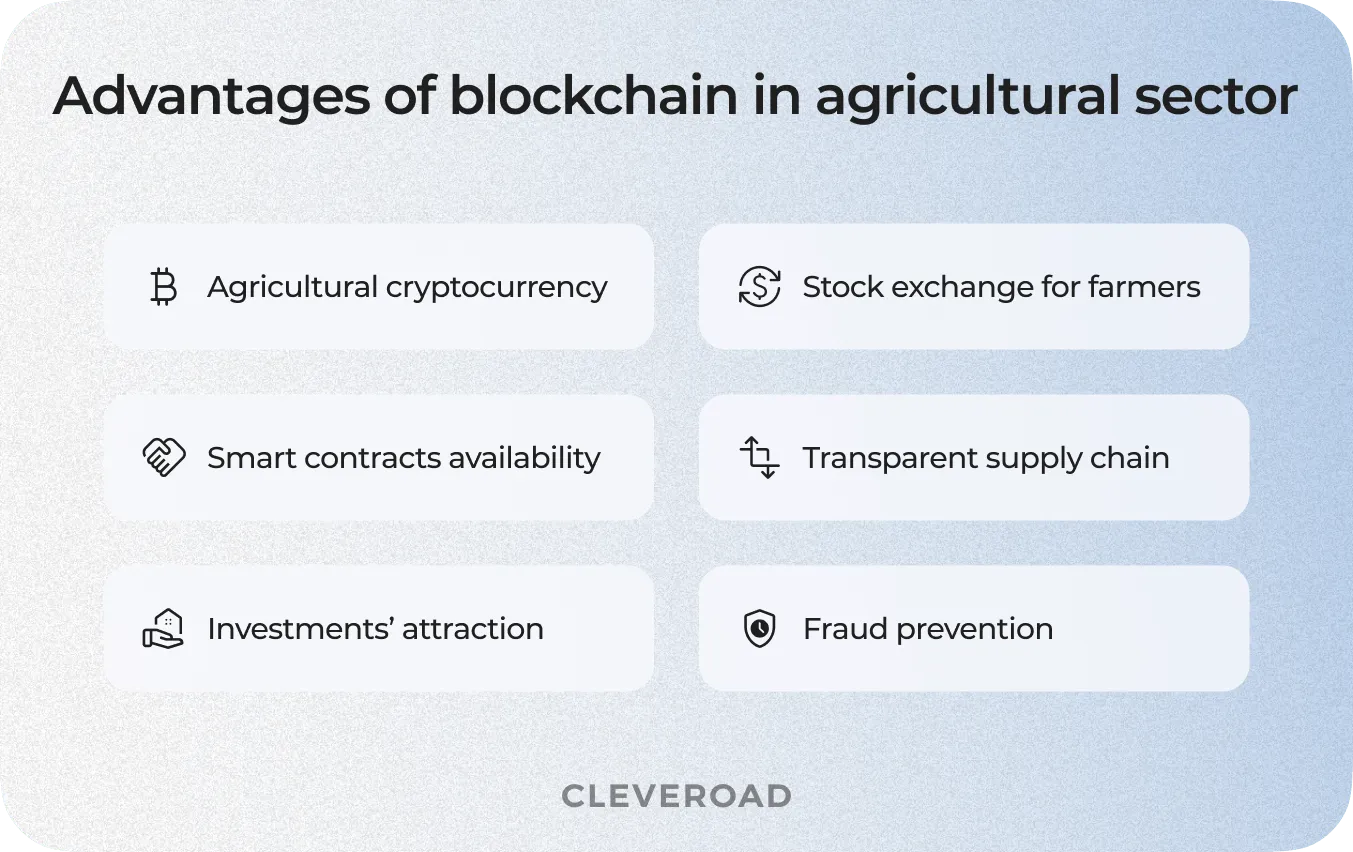
Advantages of blockchain in agricultural field
Transparent supply chain
Consumers want to know the origin of food and they even can pay additionally to find out all detailed information about the product. They can see certification, however, conventional certification can be falsified. But blockchain will make it impossible to change any record secretly, date and content will remain unchanged. Label with QR code will provide a consumer with all information about food - when poultry was born, what conditions it lived in, what diseases it had, when it was slaughtered, how much time it is stored in a shop and so on. All product history will be shown on a consumer’s smartphone. Sanitary authorities will also have a better control over all products.
Fraud prevention
As information recorded in blockchain cannot be changed and it is visible to everyone, blockchain will allow one side to protect itself from fraudulent actions and cheating. Unstipulated price reduction or increase will be impossible as well as any other machinations. The only thing you need is to find a reliable software development company with a good reputation that will make all correct records into your blockchain smart contracts and it will not let you down.
Investments' attraction
Small farms will be able to attract more investments for their business. And here ICO comes to the rescue. Initial Coin Offering is a new way to attract investments and it is a so-called cryptocurrency crowdfunding. It is a good option for small business types at early stages. Although ICO is not regulated by government in many countries and farmers will need to convince people to invest in their business, they don’t need to spend money on lawyers’ services and other related legal issues.
The power of smart contracts
Farmers supply their products and they don’t need to wait for the payment for months, as it was before. Smart contracts are written in the form of code, and when specific terms should be implemented, they are fulfilled automatically. That is, farmers fulfill their obligations, they supply products and they receive money immediately. No intermediaries and additional costs, and there is a guarantee of all obligations fulfillment. Cleveroad has enough experience in smart contract development and we can build the one that will meet all your needs.
Blockchain-based stock exchange
Blockchain in agriculture market is also represented now on stock exchanges as well. Stock exchanges remain the same but they get all the advantages of blockchain. How can farmers benefit from it? Farmers can trade futures contracts where the price for grain, animals or vegetables is fixed and it will remain fixed in future. Thus, a farmer will get it's indicated cost, and a buyer will be immune from price fluctuations.
Agricultural cryptocurrency becomes real
Everybody knows Bitcoin cryptocurrency. Today it is one of the most popular cryptocurrencies in the world. But there is another cryptocurrency called PavoCoin that was developed specifically for the agricultural sector. It is used internally for farmers and it shows a big potential. More about this project you can read below.
See what influence smart technologies have on farming. Read How can technology change farming?
How Can Blockchain Be Used in Agriculture: 4 Popular Use Cases
Of course, with the development of blockchain, the number of possible benefits will grow in the future. Well, how about ways of blockchain application in agriculture? How farmers and consumer can make use of it? Let’s consider everything in detail.
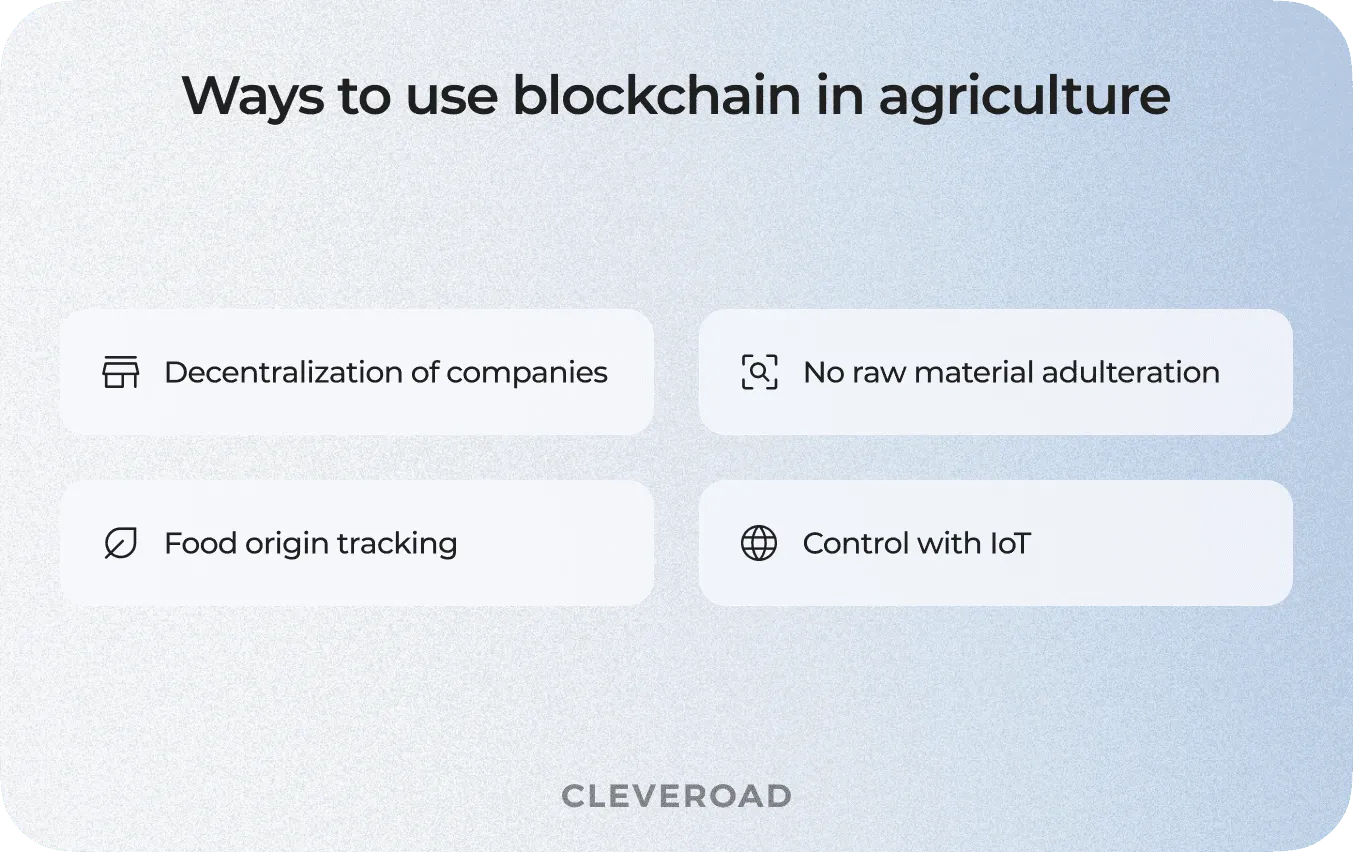
How blockchain can be used in agriculture
Tracking food origin and it's safety
When you buy an apple or chicken in a supermarket, can you say with confidence that this food is safe? Despite the fact that store representatives should have all relevant documents and certifications, you cannot see how it was stored before and whether it contains any deleterious bacteria or not. So blockchain can help consumers find out everything about each product.
It is impossible for store management to identify one infected product, so they need to see the history of origin. Blockchain-based software will keep all records, starting from where and when this apple or beef was born, how it was feed, where it was sent after ripening and so on. Thus, both consumers and contractors will know everything about food, and it will increase their trust and they will know what exactly they eat.
Successful example: Walmart corporation is collaborating with IBM for building blockchain agriculture supply chain. Specialists can scan each product in a store and see a detailed information about it. Everything is transparent and clear for all parties.
Making preventions from possible raw material adulteration
Farmers also should know that they buy high-quality grain, seeds and compound feedstuff to breed healthy animals and juicy fruits and vegetables. But the authenticity of all raw materials is not confirmed. So blockchain plays it's important role. If farmers will sell meat and crops of improper quality, it will have a negative impact both on farmer and consumer. Using blockchain, farmers will see what raw material they are going to buy, all possible black spots and so on.
Find out how IoT can be used in agriculture. Read A deep dive into IoT in agriculture: use cases, projects, peculiarities, and more
Farmers will be able to provide consumers with good products, and they will earn trust and good reputation along with high and stable profit.
Decentralization of companies
Large companies around the world occupy the agricultural niche and they can dictate their terms, set prices and agree with farmers what exactly farmers will grow and breed next season. It was unprofitable for farmers to impose their conditions since they had more dependency on large corporations. But blockchain in farming can change it once and for all.
Do you want to know about blockchain capabilities more? Watch our video below:
Real-Life Application of Blockchains in Business
Small companies can also become a serious player in the agricultural market. A small company can buy a farm share and a farmer will supply product only to them during the season. As for benefit for a farmer - he/she will have a stable work and funding, as for consumers - they will have high-quality products each season at a reasonable price. Farmer and consumer will create a smart contract where all necessary terms will be agreed. No expensive intermediaries and additional services.
Proper quality control using the Internet of Things
Monitoring the quality of animals and crops is also a very important process for all farmers and here the Internet of Things can help and make it's contribution. Irrigation amount, soil quality, the number of deleterious pests, the number of cow heads and so on can be monitored using the connection between special sensors and appropriate software installed on tablets or smartphones.
What about blockchain? All this data can be stored in blockchain, and information about animals breeding process and crops cultivation from the beginning to the end will be available for consumers. Sensors send all data automatically to the cloud where everything is kept in blockchain. Keep in mind that apart from hardware you need to have an agricultural software, and you can study our experience by examining our Case Study: How We Created A Web Solution for Fishery, experience in app for farm development, and cattle breeding.
Agriculture blockchain startups
Finally, what about successful projects that used blockchain technology in agriculture? Check out some examples.
AgriDigital
AgriDigital is an Australian company dedicated to digitizing and expanding grain supply chains to reduce processing time. Its clients include large Australian farms such as Inghams Enterprises, Fletcher, Lawson Grains and many others.
AgriLedger
The goal of this project from Great Britain is to ensure that the harvest is accounted for. The company claims that paper contracts are quite often made with errors, causing up to 50 percent of harvested crops not to reach the end consumer. AgriLedger is a feature-rich digital platform where secure transactions, negotiations, and tracking of which stages a product is at. Thanks to the project, farmers can increase their income and build relationships with business partners.
Ripe.io
San-Francisco-based startup that was born in 2017 is oriented directly on the agricultural sector. It provides consumers with a high level of transparency, and this service helps track products from field to store shelves. Ripe.io system detects humidity, ripeness, and temperature of products. A farmer can track the route of their products, adjust the system of delivery and harvesting on the basis data received. Also, a farmer will always know the condition of products at the destination.
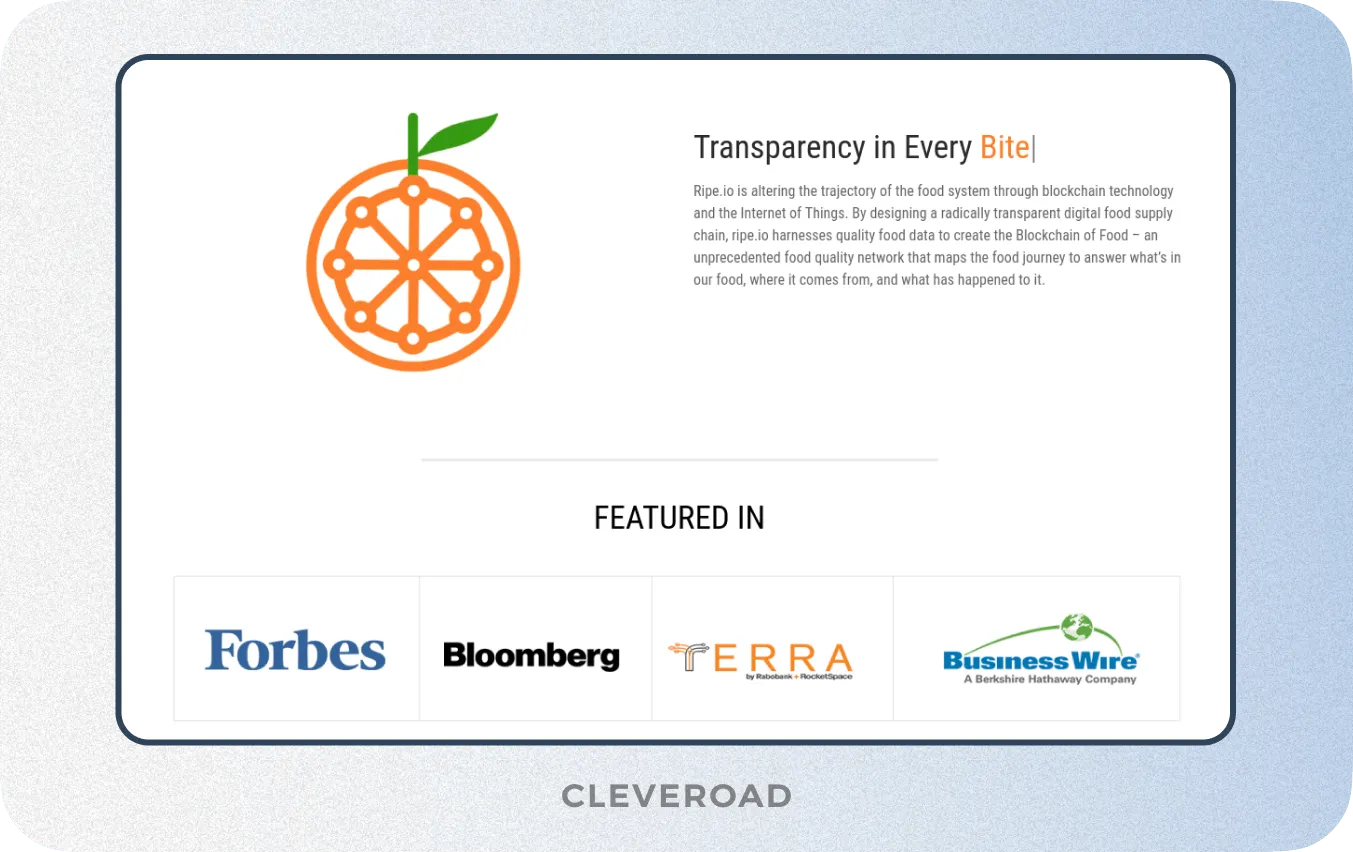
Ripe.io agricultural startup
AgriChain
This is Australia-based SaaS solution that helps improve and stabilize the grain supply chain. The service helps create smart contracts and track the logistics process to show each detail. Also, farmers can register all data about fertilizers and compound feedstuff they receive to calculate the potential output.
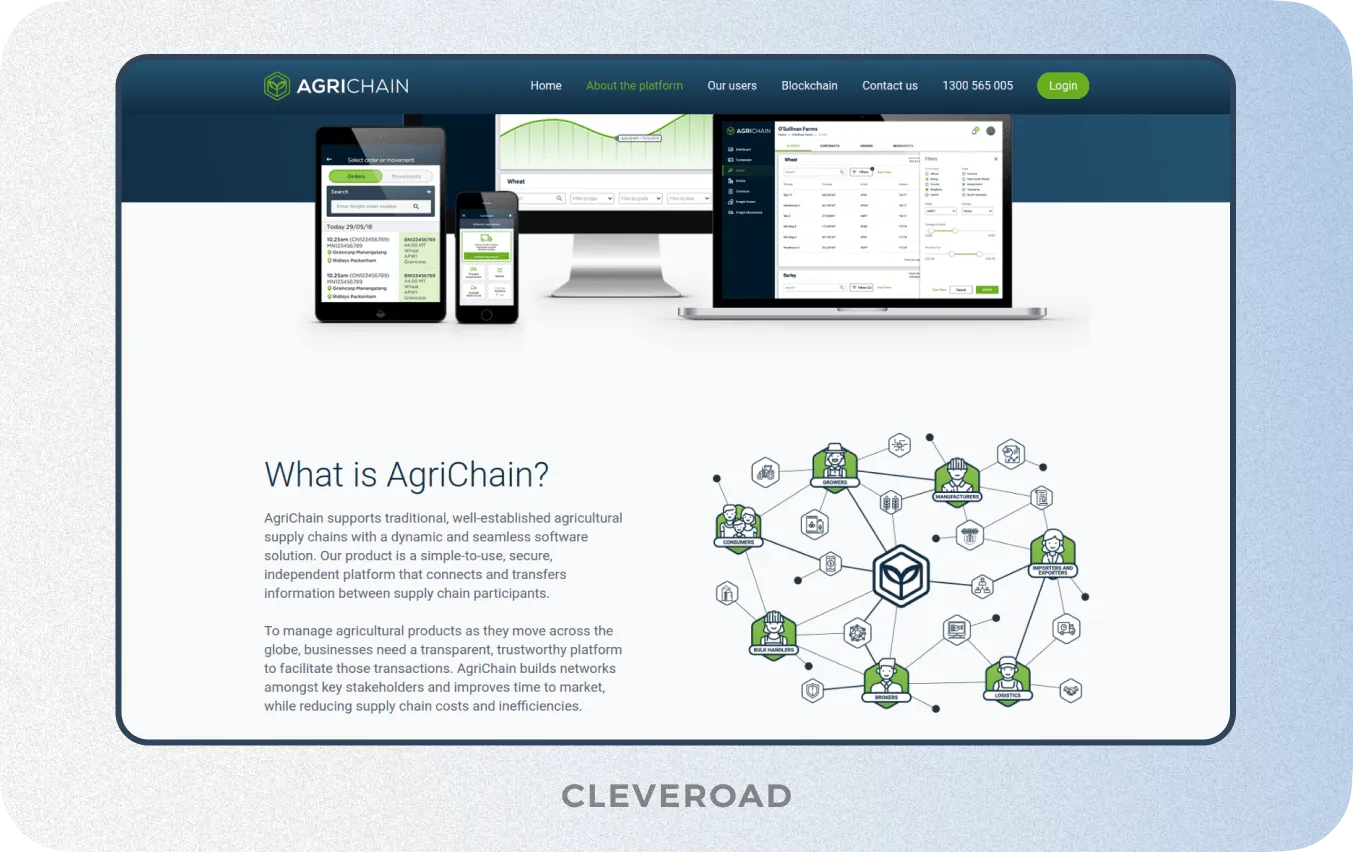
AgriChain agricultural startup
PavoCoin
Pavo is the US-based large company that has subsidiaries in many countries. And the company created PavoCoin system that helps farmers monitor the process of crops cultivation as well as gathering, processing, and distribution. All data is stored on blockchain that ensures security and legitimacy. Farmers can monitor all sensors, gather information and then this information will be fixed and filtered. Due to blockchain technology, the whole process can be easily monitored.
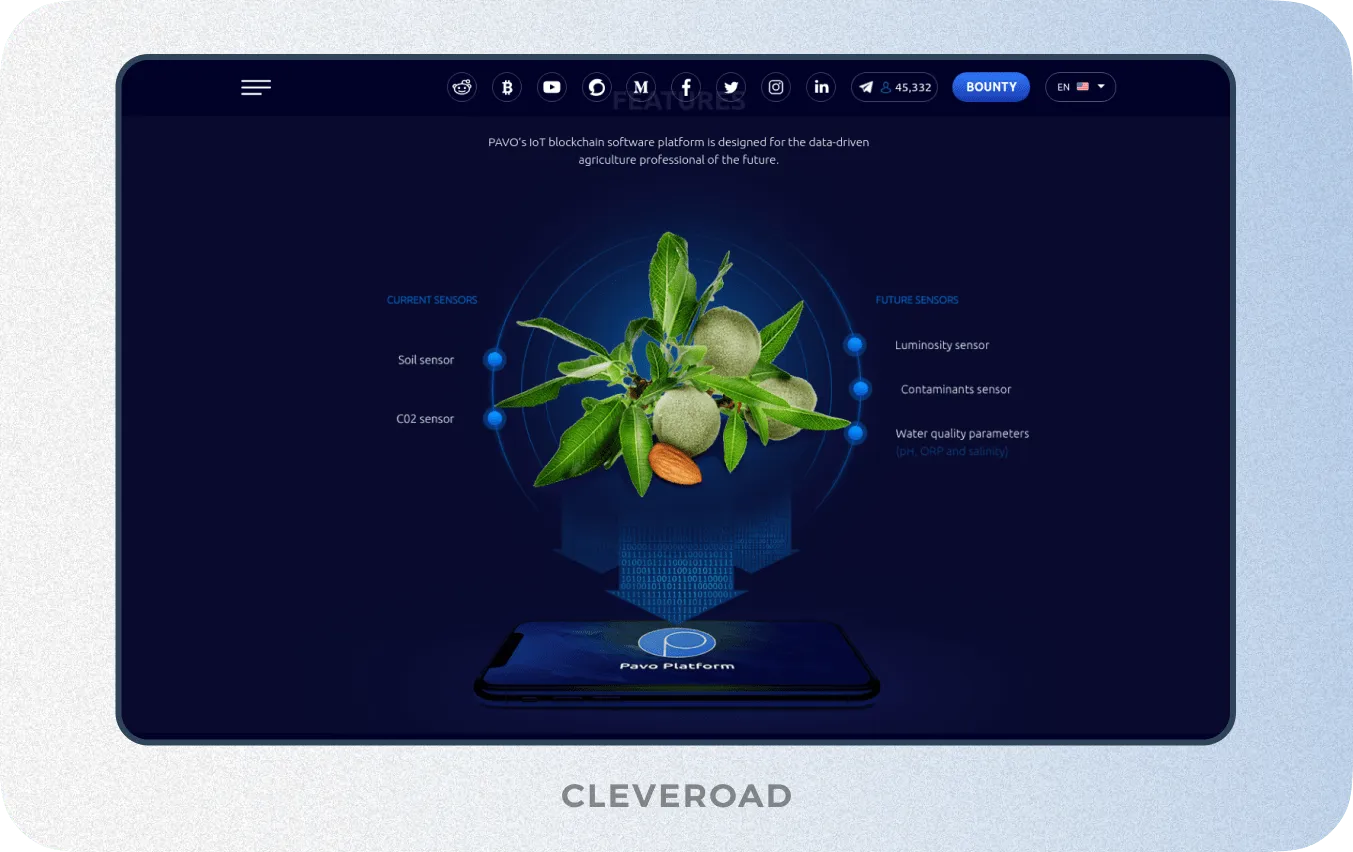
PavoCoin large agricultural startup
Tips to Implement Blockchain in Agriculture
Let’s take a look at the exemplary software development life cycle that serves as a basic roadmap for the project implementation within the blockchain.
Solution stage
This refers to ordering the services of a top-class IT vendor that has a proven experience in blockchain. You describe your agricultural project within this technology’s implementation. Next, your information is processed by the Solution Design team. In most cases, it covers business analysts (BAs), a solution architect (SA), and a designer, in case it’s required. Experts determine:
- The objectives set in your company
- The amount of work
- Major setbacks and challenges
- Fundamental quality attributes In case it’s needed to bring higher transparency to the specific details, the Solution Design team may request a meeting. After the essential details are assembled, a team prepares a rough estimate, draws up a team composition, and sets deadlines. Apart from this, the final proposal is ready. The duration of this stage is highly variable and is determined according to the project. In most of cases, it takes about two weeks.
Discovery stage
During this stage, you set your requirements and bring higher transparency to all the project details. The following questions are considered precisely for blockchain in agriculture:
- How many parties are involved in exchanging and storing data?
- Are there intermediaries that complicate the process and make it more expensive?
- How important is the speed of decision-making and transactions?
- Is there a need for an authentication procedure?
Development
Software engineers implement the app architecture by sprints. Blockchain is a base that requires applications to close individual business needs. Depending on the needs of your enterprise, developers implement the necessary functionality.
Deployment
Next, the solution is finished and ready to be deployed. Before releasing it, the team of Quality Assurance experts complete software testing to verify if all of the functions operate properly.
Maintenance and support
To ensure excellent and prolonged product operation, tech teams conduct regular maintenance. This improves software performance and makes its lifecycle as well as proper functioning longer.
When it comes to the tech provider, we are happy to become your reliable partners on the path to business digitalization. Cleveroad is a proficient software development company headquartered in Estonia. Our experience covers designing fully-fledged software for companies of all sizes to acquire state-of-the-art technologies since 2011.
We will eagerly help you in implementing your agricultural blockchain-based software. The Cleveroad team has the blockchain expert certified by Udacity. We keep expanding our competence to develop even more sophisticated and robust solutions for you.
Why is Cleveroad your trustworthy partner on the way to implementing the blockchain technologies?
- A team of secure-oriented experts
- Multi-industry competence across the most on-demand industries
- A team of qualified engineers who work with advanced blockchain frameworks, such as Ethereum and Hyperledger Fabric
- We will sign a non-disclosure agreement (NDA) at your request to ensure confidentiality of information and protect your blockchain-based project idea
- All-round Quality Assurance services with a guaranteed lack of vulnerabilities
- Fast blockchain-based project implementation flow, eliminating bureaucracy
Refine the solution with blockchain
Apply to certified Cleveroad experts and gain competitiveness in agricultural field with blockchain
As one of the examples integration of blockchain technologies into the agricultural sector will solve very big problems for all farmers - it will simplify the process of goods sale and all intermediaries will be eliminated from this chain.
Blockchain may be used in the certification of manufacturing and food processing, and it will protect the conscientious supplier.
There are several benefits that Blockchain brings to agriculture:
- Transparent supply chain
- Fraud prevention
- Investments�’ attraction
- The power of smart contracts
- Blockchain-based stock exchange
- Agricultural cryptocurrency becomes real
We've jot down several Blockchain use cases in agriculture:
- Tracking food origin and it's safety
- Making preventions from possible raw material adulteration
- Decentralization of companies
- Proper quality control using the Internet of Things
Here are several the most famous agriculture startups:
AgriDigital
AgriDigital is an Australian company dedicated to digitizing and expanding grain supply chains to reduce processing time.
AgriLedger
The goal of this project from Great Britain is to ensure that the harvest is accounted for.
Ripe.io
It provides consumers with a high level of transparency, and this service helps track products from field to store shelves. Ripe.io system detects humidity, ripeness, and temperature of products.
AgriChain
This Australian service helps create smart contracts and track the logistics process to show each detail.
PavoCoin
PavoCoin is the system that helps farmers monitor the process of crops cultivation as well as gathering, processing, and distribution.

Evgeniy Altynpara is a CTO and member of the Forbes Councils’ community of tech professionals. He is an expert in software development and technological entrepreneurship and has 10+years of experience in digital transformation consulting in Healthcare, FinTech, Supply Chain and Logistics
Give us your impressions about this article
Give us your impressions about this article
Comments
1 commentsexcellent information regarding blockchain in agriculture